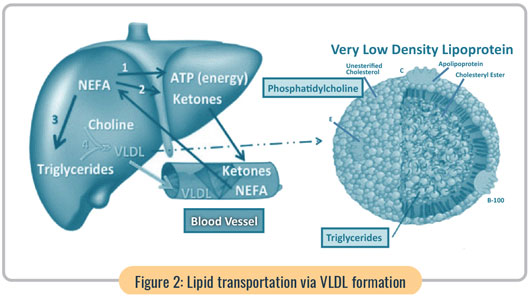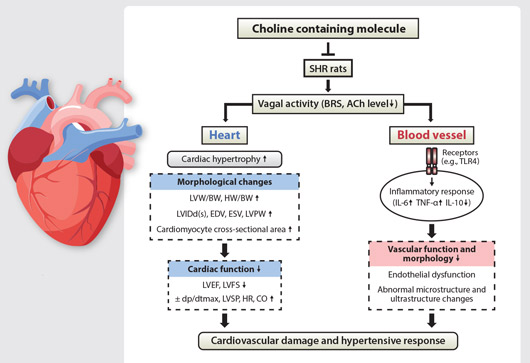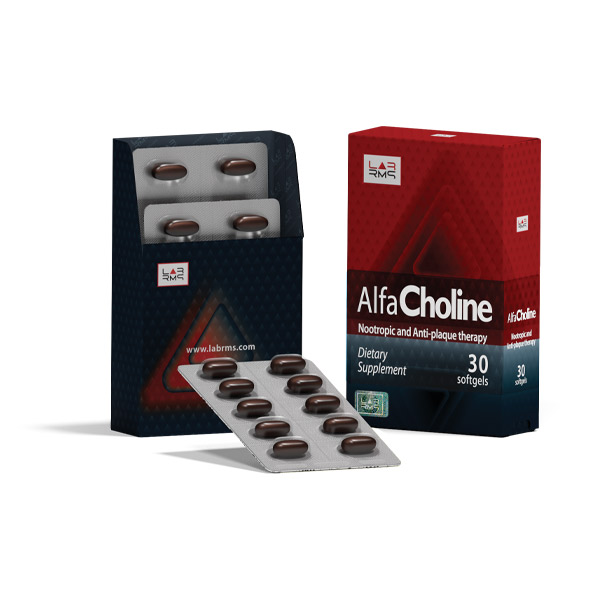AlfaCholine & AlfaCholine Pro
A Breakthrough Multi-Effective 3-in-1 Supplement for Superior Metabolic Functions
LAB RMS AlfaCholine is formulated with superior ingredients that supports overall metabolic health for a renewed you. Its number one ingredient, Choline Complex, is made up of essential combinations of choline molecules that serves different kinetics to provide you with incredible health results. Choline is especially vital for liver, brain and cardiovascular health functions as well as supporting the structural integrity of cell membranes.
BENEFITS OF ALFACHOLINE & ALFACHOLINE PRO
- Reduction of visceral fat through improvement of lipid metabolism in the liver
- Dissolves blood clots
- Reduces homocysteine level
- Reduces free fatty acid build-up at the site of stroke induced nerve damage
- Improves of cognitive functions by increasing the Acetylcholine level
- Rebuilds neurons in the brain
- Promotes Synaptogenesis
- Protects and strengthens the cell membrane
AlfaCholine and AlfaCholine Pro offer a wide-ranging role in the metabolic function of the human body. The deficiency of choline molecules in the body may accelerate non-alcoholic fatty liver disease, atherosclerosis, and possible neurological disorder.
WHICH ONE IS FOR YOU: ALFACHOLINE OR ALFACHOLINE PRO?
AlfaCholine Pro offers a more potent formula than AlfaCholine because it was formulated with higher concentrations to meet the requirements of different individuals from different age groups and nutrient requirements.
| Product Specification |  |
 |
| AlfaCholine | AlfaCholine PRO | |
| Concentration | 237mg Choline Complex
(Proprietary blend of Choline alfoscerate, cytidine diphosphate choline, phosphatidylcholine). 12mg Alpha Tocopherol |
1070mg Choline Complex
(Proprietary blend of Choline alfoscerate, cytidine diphosphate-choline, phosphatidylcholine). 12.5mg Alpha Tocopherol |
| Types of choline | Lipid soluble choline. | Combination of water-soluble choline and lipid soluble choline. |
| Unique features | Promote steady state concentration when taken at divided dosage; allow the plasma choline concentration in the body to stay consistent.
100% vegetal patented formulation. |
Supply potent bioactive at one single administration to significantly improve the plasma choline concentration and reach therapeutic concentration rapidly: for faster onset of action.
100% vegetal patented formulation. |
| Indication | Brain
Cardiovascular
Liver
Cellular Membrane
|
Brain
Cardiovascular
Liver
Cellular Membrane
|
| Contraindication |
|
|
| Mechanism of action |
Maintenance dose: achieve a target steady-state plasma concentration. |
Loading dose: achieve a therapeutic effect fast. |
| Suitable for | Teens, early adulthood, middle adulthood. | Middle adulthood with risk of Dementia and Alzheimer, late adulthood. |
| General dosage | 1 – 2 softgels. Maximum 4 softgels daily. | 1 softgel daily. |
| Available in | 30 softgels and 10 softgels pack. | |
| Storage | Room temperature, keep away from sunlight. | |
| Country of origin | Switzerland | |
ALFACHOLINE/ALFACHOLINE PRO AND THE CDP-CHOLINE PATHWAY
The CDP-choline pathway is not only accountable for the conversion of choline into phosphatidylcholine but is also integrated into a more extensive metabolic network.
Interruption of the CDP-choline pathway may affect the distribution of lipid-related metabolites in several other pathways that will result in higher phosphatidylcholine level to support cell proliferation and differentiation, but reduced Choline alfoscerate levels.
Choline alfoscerate is an organic osmolyte that is highly protective against high osmolality insults and is particularly important in renal and neural cells to make the neurotransmitter acetylcholine in distal axons.

HOW ALFACHOLINE AND ALFACHOLINE PRO PREVENTS FATTY LIVER VIA LIPOTROPIC ACTIVITY
Deficiency in choline containing molecules has been associated with accumulation of hepatic lipid, organ dysfunction and increased incidence of spontaneous fatty liver. Deficiency in choline may activate protein kinase C-mediated cell-signaling cascade and alter the expression of numerous genes regulating cell proliferation due to improper DNA methylation. This process will eventually lead to an increase in liver cell apoptosis.
Schematic illustration shows the lipotropic activity of choline containing molecules. Choline is capable to improve liver detoxification and one of the major lipotropic agents, affecting primarily the mitochondria and large granules in the liver cell. The liver produces very low-density lipoproteins (VLDL) to export fat deposition out of the liver and are storage to muscle for immediate conversion into energy. Deficiency in choline containing molecules will delay the transportation of the fat which eventually begin to build up within the liver. Those who consume alcohol in large amounts are prone to suffer from fatty liver as it increases the choline containing molecules requirement. Thus, inducing a state of relative deficiency when the diet is low in lipotropic activity.

HOW ALFACHOLINE & ALFAHOLINE PRO SUPPORTS BRAIN FUNCTION
Phosphatidylcholine and choline containing molecules such as Cytidine diphosphate-choline and Choline alfoscerate support the brain functions in various ways. Phosphatidylcholine are known to support and maintain the integrity of cellular membranes, including neuronal membranes and ensure the cell walls remain fluid so that they can effectively regulate nutrients uptake and transport. Whereas choline containing molecules have neuroprotective effects, and supports brain development via an epigenetic mechanism of action which delay symptoms of cognitive impairments and memory decline that comes with aging.
The brain cannot synthesize choline, and the uptake of choline by the brain from circulation decreases significantly with aging. The reduction of choline with aging has been linked to the degeneration of membrane phospholipids in neurodegenerative disorders and loss in cholinergic neurons activity in affected brain regions.
Choline alfoscerate can cross the blood brain barrier which will contribute to the increase of choline uptake by the aging brain. It has been shown to enhance acetylcholine levels and cholinergic neurotransmission in the hippocampus, which cause positive structural changes in the brain that is associated with cognitive functions, learning and memory.
Cytidine diphosphate-choline is metabolized to choline and uridine vicariously through cytidine. Uridine is the major form of pyrimidine nucleosides taken up by the brain and phosphorylated to pyrimidine nucleotide that serves as a precursor for RNA and DNA synthesis, and as an extracellular neurotrophic signal. In combination choline, uridine accelerates formation of synaptic membrane.

HOW ALFACHOLINE & ALFAHOLINE REDUCES CARDIOVASCULAR EVENTS VIA HOMOCYSTEINE LOWERING
One of the most common causes of stroke is the rupture of atherosclerotic plaque in the arterial wall, which leads to blood clot formation. Studies show that elevated homocysteine levels in the blood will increase the risk of cardiovascular disease caused by oxidative stress, endothelial dysfunction, inflammation, abnormal blood coagulation and disordered lipid metabolism.
With choline containing molecules that can be converted into betaine, this process is irreversible. This is because betaine is an osmolyte that regulates cell volume and protects the integrity of cells from osmotic stress. Betaine is also associated with reduction of homocysteine concentration in the blood which is important in decreasing the risk of cardiovascular disease.

Choline complex is needed for the synthesis of neurotransmitter acetylcholine, cell membrane signaling phospholipids (phosphatidylcholine, lysophosphatidylcholine, choline plasmalogen and sphingomyelin), lipid transportation (lipoprotein) and methyl group metabolism for the reduction of plasmatic homocysteine.
Cytidine diphosphate-choline
- Increases plasma uridine nucleotides and choline in the body, a key factor in synaptic strength and neural connectivity.
- Supply Cytidine (precursor for nucleotide uridine).
- CDP Choline and Uridine promotes growth of new dopamine receptors.
Phosphatidylcholine
- Serves as a reservoir for choline, involved in the hepatic transport of VLDL (very low-density lipoproteins).
- Promotes cell membrane integrity that is vital to all of the basic biological processes.
- The major components that support Sphingomyelin, Lipoprotein, Cellular Membrane, and production of Phosphatidylserine.
Choline alfoscerate
- Allows phosphatidylcholine to be used for other purpose (formation of sphingomyelin, lipoprotein, phosphatidylserine, cell membrane) instead of broken down into Choline.
- Ability to cross brain barrier, directly increase the acetylcholine level within the central nervous system.
- The precursor to the biosynthesis of neuronal cell phospholipids.
- Augment choline pool to produce betaine (betaine reduce homocysteine level in the blood).
Alpha Tocopherols
- Protects polyunsaturated fats and other components of the cell membrane from reactive oxygen species and free radicals.
- Supports neurologic functions, cardiovascular health, and liver primarily by protecting the cells from damage caused by oxidative stress.
- Promotes healthy brain ageing, delays Alzheimer’s disease, increases the oxidative resistance in vitro, prevents atherosclerotic plaque formation and prevents liver fibrosis driven by oxidative damage.
- Serves as antioxidant that protects cell membranes, proteins, and DNA from oxidation and thereby contributes to cellular health.
Visceral fat reduction:
60% of volunteers experienced reduction of visceral fat volume, range from 1-24cm².
Anti-inflammatory effect:
40% of volunteers experienced decrease in inflammatory markers in the circulatory system.
Cell integrity:
100% of volunteers showed maintained cell health and integrity.
Cognitive support:
All healthy subjects experienced positive impact on cognitive health.
Product recommendation:
100% of volunteers recommend this product to their friends and families.



